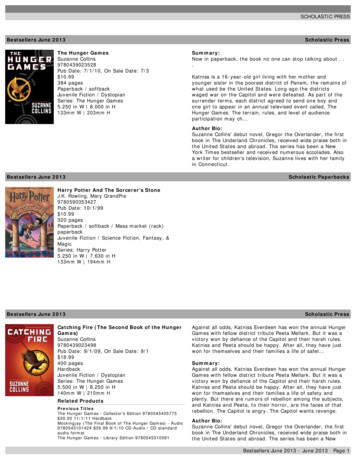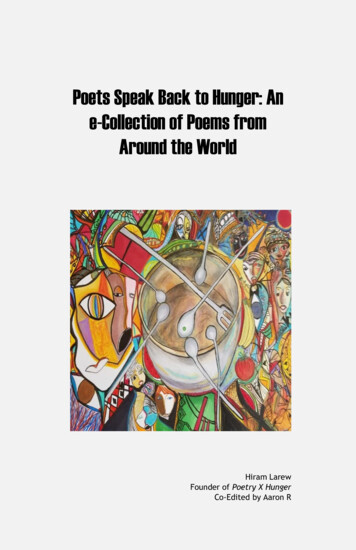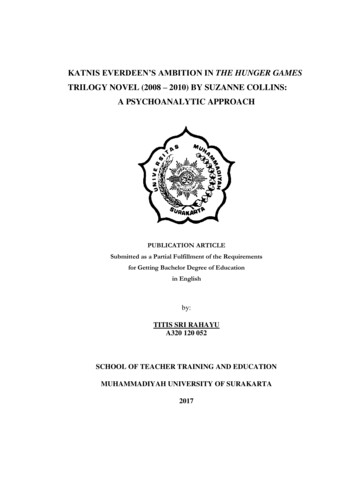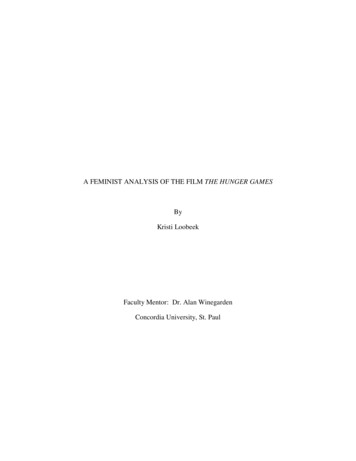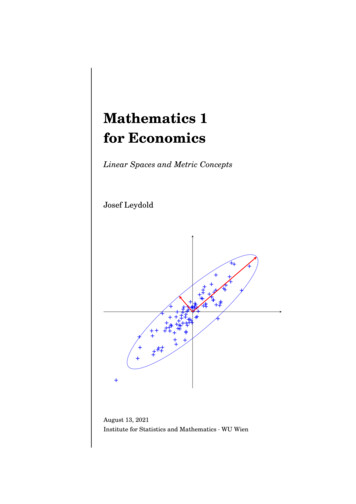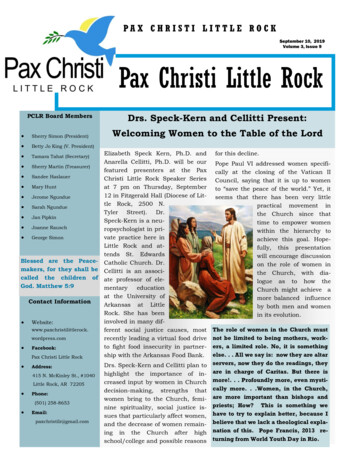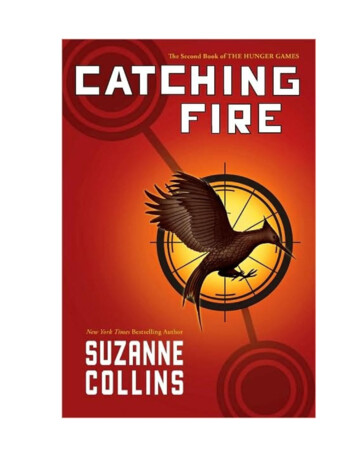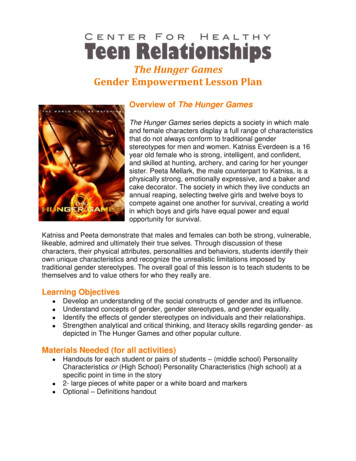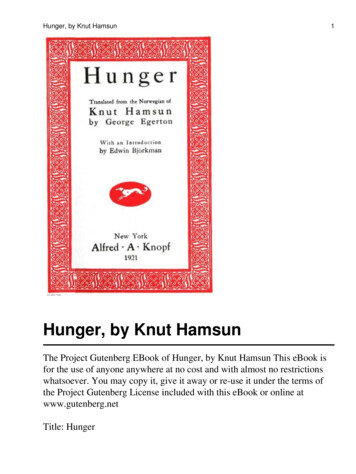
Transcription
Hunger, by Knut HamsunHunger, by Knut HamsunThe Project Gutenberg EBook of Hunger, by Knut Hamsun This eBook isfor the use of anyone anywhere at no cost and with almost no restrictionswhatsoever. You may copy it, give it away or re-use it under the terms ofthe Project Gutenberg License included with this eBook or online atwww.gutenberg.netTitle: Hunger1
Hunger, by Knut HamsunAuthor: Knut HamsunPosting Date: August 23, 2010 [EBook #8387] Release Date: June, 2005First Posted: July 6, 2003Language: EnglishCharacter set encoding: ISO-8859-1*** START OF THIS PROJECT GUTENBERG EBOOK HUNGER ***Produced by Eric Eldred, Robert Connal, and the Online DistributedProofreading TeamHUNGERby KNUT HAMSUNTranslated from the Norwegian by GEORGE EGERTONWith an introduction by Edwin BjorkmanKnut HamsunSince the death of Ibsen and Strindberg, Hamsun is undoubtedly theforemost creative writer of the Scandinavian countries. Those approachingmost nearly to his position are probably Selma Lagerlöf in Sweden andHenrik Pontoppidan in Denmark. Both these, however, seem to have lessthan he of that width of outlook, validity of interpretation and authority oftone that made the greater masters what they were.His reputation is not confined to his own country or the two Scandinaviansister nations. It spread long ago over the rest of Europe, taking deepestroots in Russia, where several editions of his collected works have alreadyappeared, and where he is spoken of as the equal of Tolstoy andDostoyevski. The enthusiasm of this approval is a characteristic symptom2
Hunger, by Knut Hamsun3that throws interesting light on Russia as well as on Hamsun.Hearing of it, one might expect him to prove a man of the masses, full ofkeen social consciousness. Instead, he must be classed as an individualisticromanticist and a highly subjective aristocrat, whose foremost passion inlife is violent, defiant deviation from everything average and ordinary. Hefears and flouts the dominance of the many, and his heroes, who arenothing but slightly varied images of himself, are invariably marked by anoriginality of speech and action that brings them close to, if not across, theborderline of the eccentric.In all the literature known to me, there is no writer who appears moreruthlessly and fearlessly himself, and the self thus presented to us is asparadoxical and rebellious as it is poetic and picturesque. Such a nature,one would think, must be the final blossoming of powerful hereditarytendencies, converging silently through numerous generations to itspredestined climax. All we know is that Hamsun's forebears were sturdyNorwegian peasant folk, said only to be differentiated from theirneighbours by certain artistic preoccupations that turned one or two of theminto skilled craftsmen. More certain it is that what may or may not havebeen innate was favoured and fostered and exaggerated by physicalenvironment and early social experiences.Hamsun was born on Aug. 4, 1860, in one of the sunny valleys of centralNorway. From there his parents moved when he was only four to settle inthe far northern district of Lofoden--that land of extremes, where the year,and not the day, is evenly divided between darkness and light; where winteris a long dreamless sleep, and summer a passionate dream without sleep;where land and sea meet and intermingle so gigantically that man is all butcrushed between the two--or else raised to titanic measures by the spectacleof their struggle.The Northland, with its glaring lights and black shadows, its unearthly joysand abysmal despairs, is present and dominant in every line that Hamsunever wrote. In that country his best tales and dramas are laid. By thatcountry his heroes are stamped wherever they roam. Out of that country
Hunger, by Knut Hamsun4they draw their principal claims to probability. Only in that country do theyseem quite at home. Today we know, however, that the pathological caserepresents nothing but an extension of perfectly normal tendencies. In thesame way we know that the miraculous atmosphere of the Northland servesmerely to develop and emphasize traits that lie slumbering in men andwomen everywhere. And on this basis the fantastic figures created byHamsun relate themselves to ordinary humanity as the microscopicenlargement of a cross section to the living tissues. What we see is true ineverything but proportion.The artist and the vagabond seem equally to have been in the blood ofHamsun from the very start. Apprenticed to a shoemaker, he used his scantsavings to arrange for the private printing of a long poem and a short novelproduced at the age of eighteen, when he was still signing himself KnudPedersen Hamsund. This done, he abruptly quit his apprenticeship andentered on that period of restless roving through trades and continentswhich lasted until his first real artistic achievement with "Hunger," In1888-90. It has often been noted that practically every one of Hamsun'sheroes is of the same age as he was then, and that their creator takesparticular pain to accentuate this fact. It is almost as if, during those days offeverish literary struggle, he had risen to heights where he saw things soclearly that no subsequent experience could add anything but occasionaldetails.Before he reached those heights, he had tried life as coal-heaver and schoolteacher, as road-mender and surveyor's attendant, as farm hand andstreetcar conductor, as lecturer and free-lance journalist, as tourist andemigrant. Twice he visited this country during the middle eighties, workingchiefly on the plains of North Dakota and in the streets of Chicago. Twiceduring that time he returned to his own country and passed through theexperiences pictured in "Hunger," before, at last, he found his own literaryself and thus also a hearing from the world at large. While here, he failedutterly to establish any sympathetic contact between himself and the newworld, and his first book after his return in 1888 was a volume of studiesnamed "The Spiritual Life of Modern America," which a prominentNorwegian critic once described as "a masterpiece of distorted criticism."
Hunger, by Knut Hamsun5But I own a copy of this book, the fly-leaf of which bears the followinginscription in the author's autograph:"A youthful work. It has ceased to represent my opinion of America. May28, 1903. Knut Hamsun."In its original form, "Hunger" was merely a sketch, and as such it appearedin 1888 in a Danish literary periodical, "New Earth." It attracted immediatewidespread attention to the author, both on account of its unusual themeand striking form. It was a new kind of realism that had nothing to do withphotographic reproduction of details. It was a professedly psychologicalstudy that had about as much in common with the old-fashionedconceptions of man's mental activities as the delirious utterances of a feverpatient. It was life, but presented in the Impressionistic temper of aGauguin or Cezanne. On the appearance of the completed novel in 1890,Hamsun was greeted as one of the chief heralds of the neo-romanticmovement then spreading rapidly through the Scandinavian north andfinding typical expressions not only in the works of theretofore unknownwriters, but in the changed moods of masters like Ibsen and Bjornson andStrindberg.It was followed two years later by "Mysteries," which pretends to be anovel, but which may be better described as a delightfully irresponsible anddefiantly subjective roaming through any highway or byway of life orletters that happened to take the author's fancy at the moment of writing.Some one has said of that book that in its abrupt swingings from laughter totears, from irreverence to awe, from the ridiculous to the sublime, one findsthe spirits of Dostoyevski and Mark Twain blended.The novels "Editor Lynge" and "New Earth," both published in 1893, weresocial studies of Christiania's Bohemia and chiefly characterized by theirviolent attacks on the men and women exercising the profession whichHamsun had just made his own. Then came "Pan" in 1894, and the realHamsun, the Hamsun who ever since has moved logically and withincreasing authority to "The Growth of the Soil," stood finally revealed. Itis a novel of the Northland, almost without a plot, and having its chief
Hunger, by Knut Hamsun6interest in a primitively spontaneous man's reactions to a nature sooverwhelming that it makes mere purposeless existence seem a sufficientend in itself. One may well question whether Hamsun has ever surpassedthe purely lyrical mood of that book, into which he poured the ecstaticdreams of the little boy from the south as, for the first time, he saw theforestclad northern mountains bathing their feet in the ocean and theircrowns in the light of a never-setting sun. It is a wonderful paean tountamed nature and to the forces let loose by it within the soul of man.Like most of the great writers over there, Hamsun has not confined himselfto one poetic mood or form, but has tried all of them. From the line ofnovels culminating in "Pan," he turned suddenly to the drama, and in 1895appeared his first play, "At the Gates of the Kingdom." It was the openingdrama of a trilogy and was followed by "The Game of Life" in 1896 and"Sunset Glow" in 1898. The first play is laid in Christiania, the second inthe Northland, and the third in Christiania again. The hero of all three isIvar Kareno, a student and thinker who is first presented to us at the age of29, then at 39, and finally at 50. His wife and several other charactersaccompany the central figure through the trilogy, of which the lesson seemsto be that every one is a rebel at 30 and a renegade at 50. But when Kareno,the irreconcilable rebel of "At the Gates of the Kingdom," theheaven-storming truth-seeker of "The Game of Life," and the acclaimedradical leader in the first acts of "Sunset Glow," surrenders at last to thepowers that be in order to gain a safe and sheltered harbor for his decliningyears, then another man of 29 stands ready to denounce him and to take upthe rebel cry of youth to which he has become a traitor. Hamsun's ironicalhumor and whimsical manner of expression do more than the plot itself toknit the plays into an organic unit, and several of the characters aredelightfully drawn, particularly the two women who play the greatest partin Kareno's life: his wife Eline, and Teresita, who is one more of his manyfeminine embodiments of the passionate and changeable Northland nature.Any attempt to give a political tendency to the trilogy must be held wasted.Characteristically, Kareno is a sort of Nietzschean rebel against thevictorious majority, and Hamsun's seemingly cynical conclusions stressman's capacity for action rather than the purposes toward which thatcapacity may be directed.
Hunger, by Knut Hamsun7Of three subsequent plays, "Vendt the Monk," (1903), "Queen Tamara"(1903) and "At the Mercy of Life" (1910), the first mentioned is by far themost remarkable. It is a verse drama in eight acts, centred about one ofHamsun's most typical vagabond heroes. The monk Vendt has much incommon with Peer Gynt without being in any way an imitation or aduplicate. He is a dreamer in revolt against the world's alleged injustice, arebel against the very powers that invisibly move the universe, and apassionate lover of life who in the end accepts it as a joyful battle and thendreams of the long peace to come. The vigor and charm of the verse proveda surprise to the critics when the play was published, as Hamsun until thenhad given no proof of any poetic gift in the narrower sense.From 1897 to 1912 Hamsun produced a series of volumes that simplymarked a further development of the tendencies shown in his first novels:"Siesta," short stories, 1897; "Victoria" a novel with a charming love storythat embodies the tenderest note in his production, 1898; "In Wonderland,"travelling sketches from the Caucasus, 1903; "Brushwood," short stories,1903; "The Wild Choir," a collection of poems, 1904; "Dreamers," a novel,1904; "Struggling Life," short stories and travelling sketches, 1905;"Beneath the Autumn Star" a novel, 1906; "Benoni," and "Rosa," twonovels forming to some extent sequels to "Pan," 1908; "A Wanderer Playswith Muted Strings," a novel, 1909; and "The Last Joy," a shapeless work,half novel and half mere uncoordinated reflections, 1912.The later part of this output seemed to indicate a lack of development, afailure to open up new vistas, that caused many to fear that the principalcontributions of Hamsun already lay behind him. Then appeared in 1913 abig novel, "Children of the Time," which in many ways struck a new note,although led up to by "Rosa" and "Benoni." The horizon is now wider, thepicture broader. There is still a central figure, and still he possesses many ofthe old Hamsun traits, but he has crossed the meridian at last and becomean observer rather than a fighter and doer. Nor is he the central figure to thesame extent as Lieutenant Glahn in "Pan" or Kareno in the trilogy. The lifepictured is the life of a certain spot of ground--Segelfoss manor, and laterthe town of Segelfoss--rather than that of one or two isolated individuals.One might almost say that Hamsun's vision has become social at last, were
Hunger, by Knut Hamsun8it not for his continued accentuation of the irreconcilable conflict betweenthe individual and the group."Segelfoss Town" in 1915 and "The Growth of the Soil"--the title ought tobe "The Earth's Increase"--in 1918 continue along the path Hamsun enteredby "Children of the Time." The scene is laid in his beloved Northland, butthe old primitive life is going--going even in the outlying districts, wherethe pioneers are already breaking ground for new permanent settlements.Business of a modern type has arrived, and much of the quiet humordisplayed in these the latest and maturest of Hamsun's works springs fromthe spectacle of its influence on the natives, whose hands used always to bein their pockets, and whose credulity in face of the improbable was onlysurpassed by their unwillingness to believe anything reasonable. Still thelife he pictures is largely primitive, with nature as man's chief antagonist,and to us of the crowded cities it brings a charm of novelty rarely found inbooks today. With it goes an understanding of human nature which is noless deep-reaching because it is apt to find expression in whimsical orflagrantly paradoxical forms.Hamsun has just celebrated his sixtieth birthday anniversary. He is asstrong and active as ever, burying himself most of the time on his littleestate in the heart of the country that has become to such a peculiar extenthis own. There is every reason to expect from him works that may not onlyequal but surpass the best of his production so far. But even if suchexpectations should prove false, the body of his work already accomplishedis such, both in quantity and quality, that he must perforce be placed in thevery front rank of the world's living writers. To the English-speaking worldhe has so far been made known only through the casual publication at longintervals of a few of his books: "Hunger," "Fictoria" and "Shallow Soil"(rendered in the list above as "New Earth"). There is now reason to believethat this negligence will be remedied, and that soon the best of Hamsun'swork will be available in English. To the American and English publics itought to prove a welcome tonic because of its very divergence from whatthey commonly feed on. And they may safely look to Hamsun as a thinkeras well as a poet and laughing dreamer, provided they realize from the startthat his thinking is suggestive rather than conclusive, and that he never
Hunger, by Knut Hamsun9meant it to be anything else.EDWIN BJÖRKMAN.Part IIt was during the time I wandered about and starved in Christiania:Christiania, this singular city, from which no man departs without carryingaway the traces of his sojourn there.*****I was lying awake in my attic and I heard a clock below strike six. It wasalready broad daylight, and people had begun to go up and down the stairs.By the door where the wall of the room was papered with old numbers ofthe Morgenbladet, I could distinguish clearly a notice from the Director ofLighthouses, and a little to the left of that an inflated advertisement ofFabian Olsens' new-baked bread.The instant I opened my eyes I began, from sheer force of habit, to think ifI had anything to rejoice over that day. I had been somewhat hard-up lately,and one after the other of my belongings had been taken to my "Uncle." Ihad grown nervous and irritable. A few times I had kept my bed for the daywith vertigo. Now and then, when luck had favoured me, I had managed toget five shillings for a feuilleton from some newspaper or other.It grew lighter and lighter, and I took to reading the advertisements near thedoor. I could even make out the grinning lean letters of "winding-sheets tobe had at Miss Andersen's" on the right of it. That occupied me for a longwhile. I heard the clock below strike eight as I got up and put on myclothes.I opened the window and looked out. From where I was standing I had aview of a clothes, line and an open field. Farther away lay the ruins of aburnt-out smithy, which some labourers were busy clearing away. I leantwith my elbows resting on the window-frame and gazed into open space. It
Hunger, by Knut Hamsun10promised to be a clear day--autumn, that tender, cool time of the year, whenall things change their colour, and die, had come to us. The ever-increasingnoise in the streets lured me out. The bare room, the floor of which rockedup and down with every step I took across it, seemed like a gasping, sinistercoffin. There was no proper fastening to the door, either, and no stove. Iused to lie on my socks at night to dry them a little by the morning. Theonly thing I had to divert myself with was a little red rocking-chair, inwhich I used to sit in the evenings and doze and muse on all manner ofthings. When it blew hard, and the door below stood open, all kinds of eeriesounds moaned up through the floor and from out the walls, and theMorgenbladet near the door was rent in strips a span long.I stood up and searched through a bundle in the corner by the bed for a bitefor breakfast, but finding nothing, went back to the window.God knows, thought I, if looking for employment will ever again avail meaught. The frequent re pulses, half-promises, and curt noes, the cherished,deluded hopes, and fresh endeavours that always resulted in nothing haddone my courage to death. As a last resource, I had applied for a place asdebt collector, but I was too late, and, besides, I could not have found thefifty shillings demanded as security. There was always something oranother in my way. I had even offered to enlist in the Fire Brigade. Therewe stood and waited in the vestibule, some half-hundred men, thrusting ourchests out to give an idea of strength and bravery, whilst an inspectorwalked up and down and scanned the applicants, felt their arms, and putone question or another to them. Me, he passed by, merely shaking hishead, saying I was rejected on account of my sight. I applied again withoutmy glasses, stood there with knitted brows, and made my eyes as sharp asneedles, but the man passed me by again with a smile; he had recognizedme. And, worse than all, I could no longer apply for a situation in the garbof a respectable man.How regularly and steadily things had gone downhill with me for a longtime, till, in the end, I was so curiously bared of every conceivable thing. Ihad not even a comb left, not even a book to read, when things grew all toosad with me. All through the summer, up in the churchyards or parks,
Hunger, by Knut Hamsun11where I used to sit and write my articles for the newspapers, I had thoughtout column after column on the most miscellaneous subjects. Strange ideas,quaint fancies, conceits of my restless brain; in despair I had often chosenthe most remote themes, that cost me long hours of intense effort, and neverwere accepted. When one piece was finished I set to work at another. I wasnot often discouraged by the editors' "no." I used to tell myself constantlythat some day I was bound to succeed; and really occasionally when I wasin luck's way, and made a hit with something, I could get five shillings foran afternoon's work.Once again I raised myself from the window, went over to thewashing-stand, and sprinkled some water on the shiny knees of my trousersto dull them a little and make them look a trifle newer. Having done this, Ipocketed paper and pencil as usual and went out. I stole very quietly downthe stairs in order not to attract my landlady's attention (a few days hadelapsed since my rent had fallen due, and I had no longer anythingwherewith to raise it).It was nine o'clock. The roll of vehicles and hum of voices filled the air, amighty morning-choir mingled with the footsteps of the pedestrians, andthe crack of the hack-drivers' whips. The clamorous traffic everywhereexhilarated me at once, and I began to feel more and more contented.Nothing was farther from my intention than to merely take a morning walkin the open air. What had the air to do with my lungs? I was strong as agiant; could stop a dray with my shoulders. A sweet, unwonted mood, afeeling of lightsome happy-go-luckiness took possession of me. I fell toobserving the people I met and who passed me, to reading the placards onthe wall, noted even the impression of a glance thrown at me from apassing tram-car, let each bagatelle, each trifling incident that crossed orvanished from my path impress me.If one only had just a little to eat on such a lightsome day! The sense of theglad morning overwhelmed me; my satisfaction became ill-regulated, andfor no definite reason I began to hum joyfully.
Hunger, by Knut Hamsun12At a butcher's stall a woman stood speculating on sausage for dinner. As Ipassed her she looked up at me. She had but one tooth in the front of herhead. I had become so nervous and easily affected in the last few days thatthe woman's face made a loathsome impression upon me. The long yellowsnag looked like a little finger pointing out of her gum, and her gaze wasstill full of sausage as she turned it upon me. I immediately lost all appetite,and a feeling of nausea came over me. When I reached the market-place Iwent to the fountain and drank a little. I looked up; the dial marked ten onOur Saviour's tower.I went on through the streets, listlessly, without troubling myself aboutanything at all, stopped aimlessly at a corner, turned off into a side streetwithout having any errand there. I simply let myself go, wandered about inthe pleasant morning, swinging myself care-free to and fro amongst otherhappy human beings. This air was clear and bright and my mind too waswithout a shadow.For quite ten minutes I had had an old lame man ahead of me. He carried abundle in one hand and exerted his whole body, using all his strength in hisendeavours to get along speedily. I could hear how he panted from theexertion, and it occurred to me that I might offer to bear his bundle for him,but yet I made no effort to overtake him. Up in Graendsen I met HansPauli, who nodded and hurried past me. Why was he in such a hurry? I hadnot the slightest intention of asking him for a shilling, and, more than that, Iintended at the very first opportunity to return him a blanket which I hadborrowed from him some weeks before.Just wait until I could get my foot on the ladder, I would be beholden to noman, not even for a blanket. Perhaps even this very day I might commencean article on the "Crimes of Futurity," "Freedom of Will," or what not, atany rate, something worth reading, something for which I would at least getten shillings. And at the thought of this article I felt myself fired with adesire to set to work immediately and to draw from the contents of myoverflowing brain. I would find a suitable place to write in the park and notrest until I had completed my article.
Hunger, by Knut Hamsun13But the old cripple was still making the same sprawling movements aheadof me up the street. The sight of this infirm creature constantly in front ofme, commenced to irritate me--his journey seemed endless; perhaps he hadmade up his mind to go to exactly the same place as I had, and I must needshave him before my eyes the whole way. In my irritation it seemed to methat he slackened his pace a little at every cross street, as if waiting to seewhich direction I intended to take, upon which he would again swing hisbundle in the air and peg away with all his might to keep ahead of me. Ifollow and watch this tiresome creature and get more and more exasperatedwith him, I am conscious that he has, little by little, destroyed my happymood and dragged the pure, beautiful morning down to the level of his ownugliness. He looks like a great sprawling reptile striving with might andmain to win a place in the world and reserve the footpath for himself. Whenwe reached the top of the hill I determined to put up with it no longer. Iturned to a shop window and stopped in order to give him an opportunity ofgetting ahead, but when, after a lapse of some minutes, I again walked onthere was the man still in front of me--he too had stood stock still,--withoutstopping to reflect I made three or four furious onward strides, caught himup, and slapped him on the shoulder.He stopped directly, and we both stared at one another fixedly. "Ahalfpenny for milk!" he whined, twisting his head askew.So that was how the wind blew. I felt in my pockets and said: "For milk,eh? Hum-m--money's scarce these times, and I don't really know how muchyou are in need of it.""I haven't eaten a morsel since yesterday in Drammen; I haven't got afarthing, nor have I got any work yet!""Are you an artisan?""Yes; a binder.""A what?"
Hunger, by Knut Hamsun14"A shoe-binder; for that matter, I can make shoes too.""Ah, that alters the case," said I, "you wait here for some, minutes and Ishall go and get a little money for you; just a few pence."I hurried as fast as I could down Pyle Street, where I knew of a pawnbrokeron a second-floor (one, besides, to whom I had never been before). When Igot inside the hall I hastily took off my waistcoat, rolled it up, and put itunder my arm; after which I went upstairs and knocked at the office door. Ibowed on entering, and threw the waistcoat on the counter."One-and-six," said the man."Yes, yes, thanks," I replied. "If it weren't that it was beginning to be a littletight for me, of course I wouldn't part with it."I got the money and the ticket, and went back. Considering all things,pawning that waistcoat was a capital notion. I would have money enoughover for a plentiful breakfast, and before evening my thesis on the "Crimesof Futurity" would be ready. I began to find existence more alluring; and Ihurried back to the man to get rid of him."There it is," said I. "I am glad you applied to me first."The man took the money and scrutinized me closely. At what was hestanding there staring? I had a feeling that he particularly examined theknees of my trousers, and his shameless effrontery bored me. Did thescoundrel imagine that I really was as poor as I looked? Had I not as goodas begun to write an article for half-a-sovereign? Besides, I had no fearwhatever for the future. I had many irons in the fire. What on earth businesswas it of an utter stranger if I chose to stand him a drink on such a lovelyday? The man's look annoyed me, and I made up my mind to give him agood dressing-down before I left him. I threw back my shoulders, and said:"My good fellow, you have adopted a most unpleasant habit of staring at aman's knees when he gives you a shilling."
Hunger, by Knut Hamsun15He leant his head back against the wall and opened his mouth widely;something was working in that empty pate of his, and he evidently came tothe conclusion that I meant to best him in some way, for he handed meback the money. I stamped on the pavement, and, swearing at him, told himto keep it. Did he imagine I was going to all that trouble for nothing? If allcame to all, perhaps I owed him this shilling; I had just recollected an olddebt; he was standing before an honest man, honourable to hisfinger-tips--in short, the money was his. Oh, no thanks were needed; it hadbeen a pleasure to me. Good-bye!I went on. At last I was freed from this work-ridden plague, and I could gomy way in peace. I turned down Pyle Street again, and stopped before agrocer's shop. The whole window was filled with eatables, and I decided togo in and get something to take with me."A piece of cheese and a French roll," I said, and threw my sixpence on tothe counter."Bread and cheese for the whole of it?" asked the woman ironically,without looking up at me."For the whole sixpence? Yes," I answered, unruffled.I took them up, bade the fat old woman good-morning, with the utmostpoliteness, and sped, full tilt, up Castle Hill to the park.I found a bench to myself, and began to bite greedily into my provender. Itdid me good; it was a long time since I had had such a square meal, and, bydegrees, I felt the same sated quiet steal over me that one feels after a goodlong cry. My courage rose mightily. I could no longer be satisfied withwriting an article about anything so simple and straight-ahead as the"Crimes of Futurity," that any ass might arrive at, ay, simply deduct fromhistory. I felt capable of a much greater effort than that; I was in a fittingmood to overcome difficulties, and I decided on a treatise, in three sections,on "Philosophical Cognition." This would, naturally, give me anopportunity of crushing pitiably some of Kant's sophistries . but, on taking
Hunger, by Knut Hamsun16out my writing materials to commence work, I discovered that I no longerowned a pencil: I had forgotten it in the pawn-office. My pencil was lyingin my waistcoat pocket.Good Lord! how everything seems to take a de
The Project Gutenberg EBook of Hunger, by Knut Hamsun This eBook is for the use of anyone anywhere at no cost and with almost no restrictions whatsoever. You may copy it, give it away or re-use it under the terms of the Project Gutenberg License included with this eBook or online at www.gutenberg.net Title: Hunger Hunger, by Knut Hamsun 1

